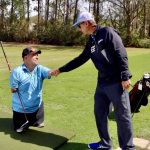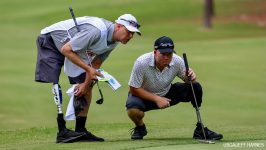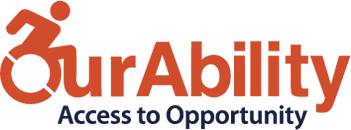
Disability:IN New Jersey Annual Virtual Job Fair
August 29, 2022
New Video Program Seeks to Help Adaptive Golfers
September 6, 2022Golf Opening Its Arms to Adaptive Athletes Everywhere

By John Robinson
For years, people with disabilities were treated differently in sports. Doors were not open to us. We were considered “insurance liabilities,” not a means to grow or advance the games. Certainly, nobody thought of profiting off our love of the games.
I learned this first-hand as an 8-year-old growing up in the small Binghamton, N.Y., suburb of Greene. After playing my first love, baseball, for three years, I was one day told I couldn’t play anymore. The local Little League organization decided I was too much at risk of getting hurt. Naturally, I was devastated. I had played Tee-ball for three years and even had a designated runner. So what changed? Why was I now suddenly deemed a “liability” in their eyes?
Little did I know at that moment what a game-changing event this would be in my life. That very same day, my father went to the local golf course in town, bought me a used, left-handed 7-iron and putter, cut them down, presented them to me and said, “They can never take this away from you.”
Boy was he right!
Fast forward some 45 years, and not only am I still playing golf, but I’m playing almost every day. I have a membership to one of the best country clubs in the Albany, N.Y., area. I’m competing and having a blast. Thanks to the USGA Handicap System, shorter tees and modified golf equipment, I’m able to play golf on a fairly level playing field with others, including able-bodied golfers. For more than 30 years now I’ve been playing in Member Guest tournaments, Wednesday night leagues and various other tournaments throughout Central and Upstate New York.
But it wasn’t until last month that I played in my very first Adaptive Golf tournament, a 36-hole event in Brunswick, Maine, hosted by the Amputee Association of Maine. This came just days before the very first U.S. Adaptive Open (pictured) was held at Pinehurst Resort & Country Club in Pinehurst, N.C.—the USGA’s 15th national championship. Ninety-six golfers from around the world with various physical, intellectual and neurological impairments competed in the 54-hole event on Pinehurst No. 6, with individual winners being crowned in eight separate categories. One of those individual champions was World Golf Hall of Famer and “seated golfer” Dennis Walters, who has been entertaining and inspiring hundreds of thousands of people over the years from his wheelchair with his amazing trick-shot show.
The USGA (United States Golf Association) is the governing body of golf here in the U.S., and for them to sanction and hold a golf tournament for adaptive golfers, it just gives you goosebumps. It shows you that people with disabilities matter. Dennis Walters matters. I matter. It makes other golfers look at you differently when you’re on the golf course. If I saw myself golfing, I might think it was a gimmick, but having the USGA and other organizations sanction us, it gives us some validity, and that’s really important not only for us, but the next generation of people with disabilities.
We’ve been on a good trajectory of late with adaptive sports. As the Summer and Winter Paralympic Games have gotten bigger, especially in the last decade, there have become more opportunities for people with disabilities to ski, cycle, run, golf and play other sports. Our Ability, Inc., was invited to witness the London 2012 Paralympic Games, and we saw a packed Olympic Stadium for many of the track events. That was incredible to see, and such a big testament to the validity of adaptive sports. I realized then it was a much bigger universe than I ever imagined it was, and when I got home, I couldn’t wait to get involved in other activities. That’s when I took up hand cycling and came up with the idea of biking the Erie Canal.
But golf has been my greatest and longest love, and with various organizations such as the USGA, U.S. Adaptive Golf Alliance (USAGA), U.S. Disabled Golf Association and Adaptive Sports USA now funding so many adaptive golf tournaments, it’s fair to say the sky is the limit for adaptive golf. The National Golf Foundation (NGF) estimates there are approximately 600,000 disabled golfers in the U.S., and another 6 million more who once played golf but gave it up after becoming disabled.
If you’re one of the latter people and are thinking of taking up the game again, or you’re reading this and thinking this might be a great time for you to learn how to play golf, do it! There are so many life skills and advantages to playing golf, probably none more valuable than the camaraderie that you feel playing golf with others—whether they’re able-bodied or not.
In Maine, I got to play with two golfers who both lost a leg due to motorcycle accidents. By day two, I was more interested in talking to these guys about our similar experiences with disabilities than I was playing golf. When people with disabilities get together, there comes a point where you start talking about two things: 1) how other people treat you differently; and 2) how your disability manifests. One of the guys was from Singapore and we talked about what it was like to play there, and what the other members were saying (about his disability). And we talked about the physical pain of golfing. Not the challenge of playing golf, but the challenge of getting around when we play.
The funny thing about golf is that it’s a game of excuses. But playing with other people with disabilities, we actually can talk about our disabilities without feeling like we want pity from an able-bodied person, which we don’t. When I play with my buddies, I can’t say my hips are killing me because they’re going to think I’m looking for pity. But when I play with other disabled golfers, I can say that and they’ll understand.
In addition to the organizations above, there are many state-run golf associations creating opportunities for people with disabilities to play golf against one another. I’m currently in talks with the New York Golf Association about hosting a New York State Adaptive Open in 2023.
Of course, I’d love to tee it up in the second U.S. Adaptive Open in Pinehurst next July as well. It’s definitely a big goal of mine. But it’s just as important for me to play Saturday mornings with my normal crew and have fun. That’s the important part, that I can play. It wasn’t too long ago that I couldn’t, and that sports weren’t inclusive for all. We’ve come a long, long way since the 1970s, and with golf leading the way, the best is still yet to come.


